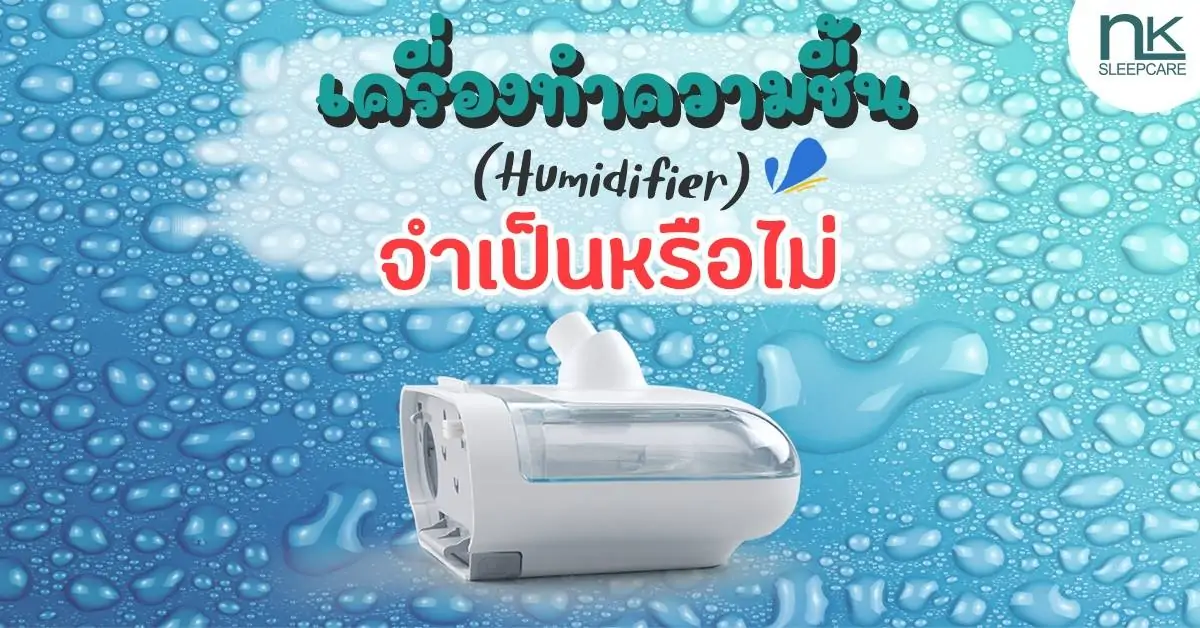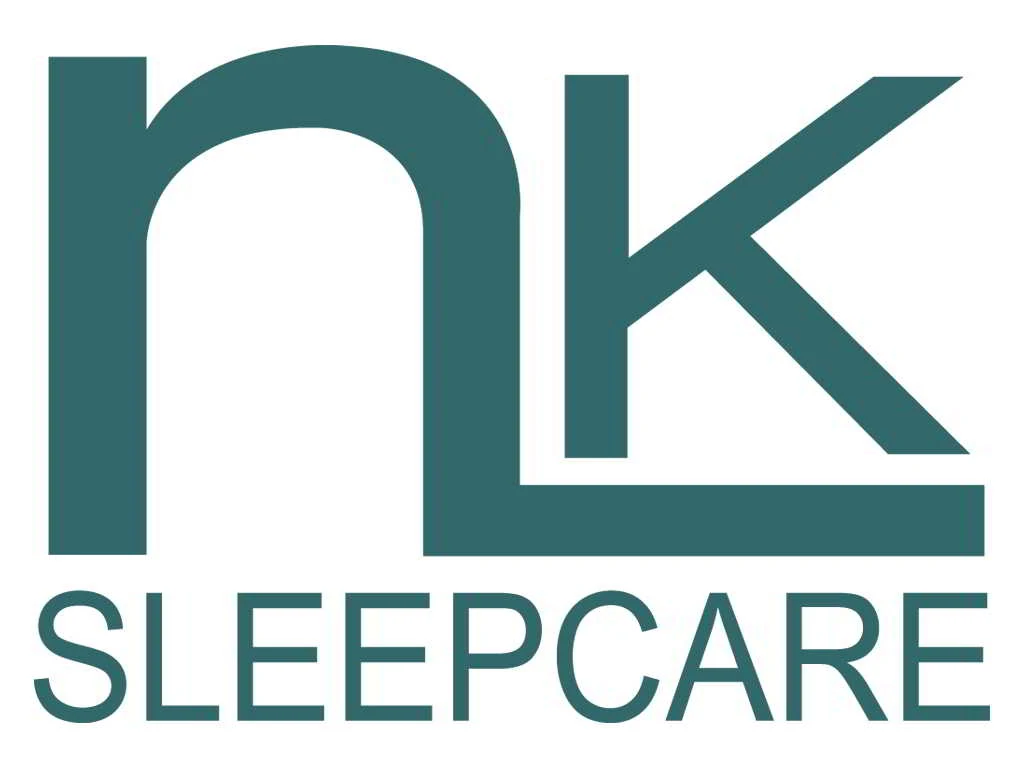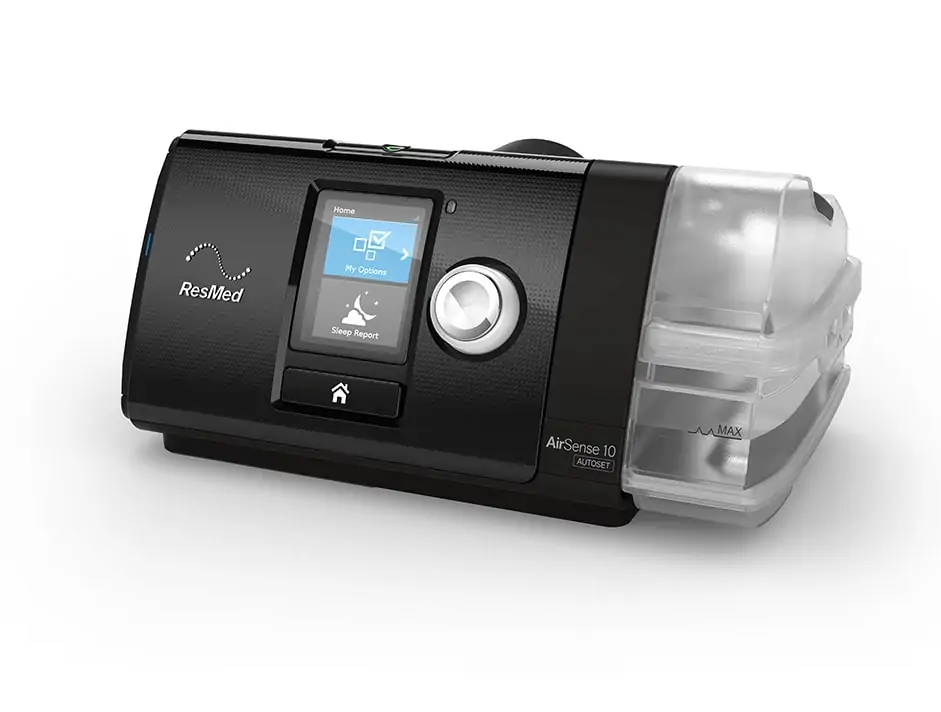Is a humidifier in a CPAP machine necessary?

Continuous Positive Airway Pressure (CPAP) is a suitable treatment for patients with all levels of upper airway obstruction during sleep. whether it is a patient with normal snoring problems or have sleep apnea violent from mild to very severe
The air that comes out of a CPAP machine has a higher pressure and flow rate than the air that we normally breathe in when the machine is not in use. which may cause dry throat or burning in the nasal passages in some people
to solve the above problem One of the most popular accessories used with CPAP machines is Heated humidifier to increase humidity (humidity) in the air passing through the CPAP machine
Factors in determining whether a humidifier should be used as well
Determining whether a humidifier is necessary can be considered from the following factors
1. Humidity conditions in the bedroom or room where the CPAP machine is used.
Thailand is a hot and humid country. If the patient uses the CPAP machine in a normal room (without air conditioning or a blowing fan) there would be no problem with the user's nasal mucosa. You may not need a humidifier.
But if using a CPAP machine in an air-conditioned room or the patient turns on the fan blowing at that point Without a humidifier There may be a problem called Chronic inflammation of the nasal mucosa caused by using a CPAP machine (CPAP-induced rhinitis) can result. In this case it is recommended to use a humidifier.
2. The level of air pressure used (therapy pressure)
If you have moderate or severe snoring or sleep apnea The air pressure used is usually high, e.g. more than 10 cmH2O.
This high air pressure can often dry out the nasal passages and throat. In this case it is recommended to use a humidifier.
3. physical condition
Some people may have allergies. or the nasal cavity is easily irritated In this case, although the air pressure used is not high or not sleeping in an air-conditioned roomThe use of a humidifier is also recommended.
4. Do you wake up dry?
This is a simple observation. You may not have to consider other things at all. That is, if you use CPAP and wake up with a dry throat, thenThe use of a humidifier is also recommended.
5. Using CPAP abroad
If you use the CPAP machine in a cold country or low humidityThe use of a humidifier is also recommended.
The disadvantages of using CPAP without a humidifier
If you use CPAP without a humidifier In the air-conditioned room Dry and cool air from the air conditioner. Throughout the nasal cavity, the patient uses the CPAP machine in the bedroom.
which results in chronic inflammation of the nasal mucosa and abnormal sensitivity Causing patients to have nasal congestion, itching, sneezing, runny nose or having phlegm in the throat easily Especially when waking up in the morning and swelling of the nasal mucosa which is when the nasal mucosa is abnormally swollen It will affect the use of your CPAP machine as follows.
- If the patient is using Auto CPAP, the machine will increase the pressure to inject more air into the nasal cavity. make the patient feel more uncomfortable and there may be air leaking from the mask The patient may need to tighten the mask that covers the nose or mouth. Until causing a mask mark on the patient's face when he wakes up in the morning
- If the patient is using Manual CPAP, the pressure to inject air into the nasal cavity remains constant. which if the nasopharynx is swollen Will cause the remaining pressure to widen the other parts of the airway to decrease, resulting in the effectiveness in treating snoring and decreased sleep apnea The patient may return to noise. or return to sleep apnea
However, chronic rhinitis problems caused by using this CPAP machine may occur slowly for some people. Some people may be born early. Therefore, patients using CPAP machines should decide whether will let this problem happen first then return to treatment or will prevent this problem from occurring
watch CPAP machine price all models here
What kind of water should I use to fill my humidifier?
Recommended by the manufacturer is medical distilled water. And must be the type that is specified on the bottle as Sterile water for inhalation, but in reality this type of water is quite difficult to find and has a high price. It is therefore recommended for patients using a BiPAP ventilator or above, or tracheostomy patients.
For general CPAP machine users, the following water is recommended to fill the humidifier:
- bottled water
- boiled water
- filtered water
do not use tap water because it is chlorinated water and will cause sediment in the water bottle
Tips for using a humidifier
- Clean the water bottle every The morning after the CPAP/BiPAP machine has been deactivated and air dried. Do not expose to the sun
- Change the water every time before use.
- Add water to the middle level. Do not exceed the Max mark because it may cause water to flow into the machine.
- Always pour out the water. before moving the machine to prevent water from flowing into the machine
summarize
It's important to determine whether a humidifier should be used with a CPAP as well. Let's look at factors such as sleeping in a room with dry air, such as an air-conditioned room or not. or the air pressure level used is high or not Or have a congenital disease, allergy or not, etc.
However, if you can find a humidifier to use. I recommend using it. Because the air from the CPAP machine, even at the lowest pressure, still has a higher flow rate than normal breathing. which the wind passes at a higher speed than normal for a long time In the long run, it can cause nasal inflammation.
In addition, breathing air that is warm and moist enough to enter. will make you sleep more comfortably as well We hope this information is helpful for those of you who are deciding whether to Should I use a humidifier with CPAP or not?





Thank you for the information.
Hello Cuff, the company should provide information for what kind of distilled water to use with this machine. for the convenience of making purchasing decisions for customers Anyway, it's printed to let me know and it's more convenient to use.
Angkoon Wattanawin
Thank you for your advice. I have added two new topics, “What kind of water should I use to fill my humidifier?” and “Recommendations for using a humidifier” in the article. The content is as follows.
What kind of water should I use to fill my humidifier?
Recommended by the manufacturer is medical distilled water. And must be the type that is specified on the bottle as Sterile water for inhalation, but in reality this type of water is quite difficult to find and has a high price. It is therefore recommended for patients using a BiPAP ventilator or above, or tracheostomy patients.
For general CPAP machine users, the following water is recommended to fill the humidifier:
*Do not use tap water because it is chlorinated water and will cause sediment in the water bottle
Tips for using a humidifier
อยากทราบความหมายของสัญลักษณ์บนจอจองเครื่องค่ะ เช่นหน้ายิ้ม หน้าแดง ขอบคุณค่ะ และอีกอย่างปริมาณน้ำที่ลดลงมากน้อย ในแต่ละคืนนี่บ่งบอกถึงอะไรคะ ลดลงมากดีหรือไม่ดีคะ ขอบคุณนะคะ
ต้องขออภัยที่ตอบกลับช้านะครับ
หลังจากที่เราปิดเครื่อง CPAP ResMed ในตระกูล AirSense 10 หน้าจอจะแสดงรายงานสรุปการใช้งานออกมา 3 ค่า ได้แก่ Usage hours, Mask Seal และ Humdifier โดย Usage hours คือ จำนวนชั่วโมงที่ใช้งานในคืนที่ผ่านมา Mask Seal คือการใส่หน้ากากว่ากระชับดีหรือไม่ และ Humidifer คือการใช้งานเครื่องทำความชื้น โดย 2 ค่าหลังคือ Mask Seal และ Humidifier จะแสดงเป็นสัญลักษณ์หน้ายิ้มหรือหน้าแดง โดยแปลได้ดังนี้
Mask Seal หน้ายิ้ม = ใส่หน้ากากได้กระชับดี ไม่มีการั่วเกินค่าที่กำหนด
Mask Seal หน้าแดง = ใส่หน้ากากไม่ดี มีการั่วของอากาศเกินค่าที่กำหนด ต้องปรับการใส่หน้ากากใหม่
Humidifier หน้ายิ้ม = เครื่องทำความชื้นทำงานเป็นปกติ
Humidifier หน้าแดง = เครื่องทำความชื้นทำงานผิดปกติ ให้ติดต่อบริษัทที่ท่านซื้อเครื่องมา